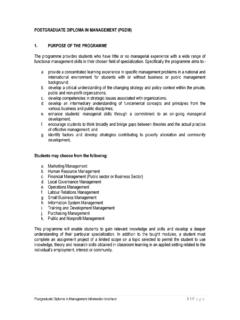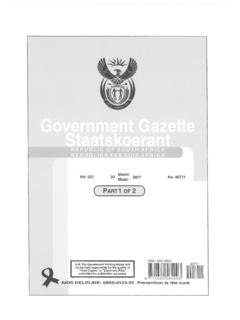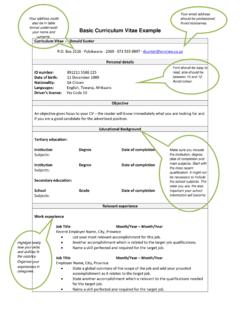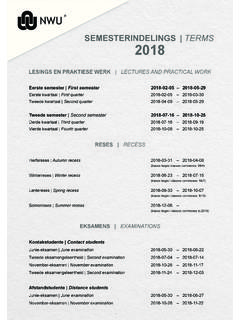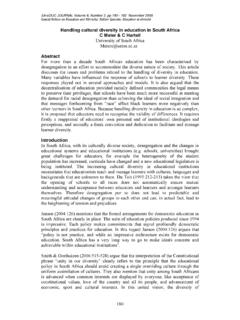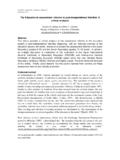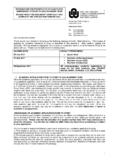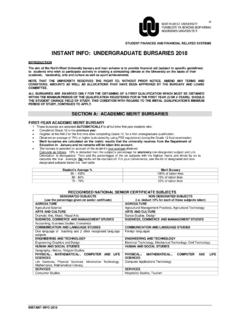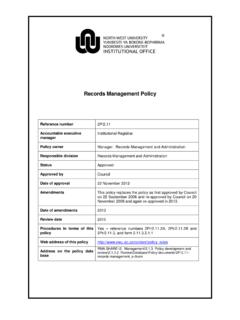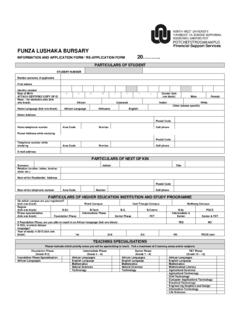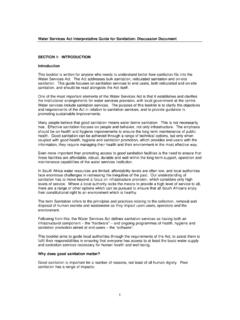Transcription of Basic Sanitation in South Africa - North-West …
1 Basic Sanitation in South Africa :A Guide to Legislation, Policy and PracticeKate TissingtonSocio-Economic Rights Institute of South Africa (SERI)July 2011 Design and Layout: TissingtonSocio-Economic Rights Institute of South Africa (SERI)July 2011A Guide to Legislation, Policy and PracticeBasic Sanitation in South Africa :[ii] Basic Sanitation in South Africa : A Guide to Legislation, Policy and PracticePreface and AcknowledgementsThe Socio-Economic Rights Institute of South Africa (SERI) is a non-profit organisation providing professional and dedicated socio-economic rights assistance to individuals, communities and social movements in South Africa . SERI conducts research, engages with government, advocates for policy and legal reform, facilitates civil society coordination and mobilisation, provides legal advice and litigates in the public interest. Our thematic areas are housing and evictions, access to Basic services (water, Sanitation and electricity) and migrant rights & s work is funded by the Atlantic Philanthropies, Ford Foundation, Open Society Foundation and MISEREOR and their funding contribution to this research is gratefully guide aims to provide a simplified yet comprehensive overview of legislation, policy, programmes and practice relating to Basic Sanitation in South Africa .
2 The guide focuses on access to household Sanitation by poor communities. While some progress has been made since 1994 in terms of the provision of Basic Sanitation , challenges remain in the formulation and implementation of policy by municipalities. The guide does not claim to be an exhaustive analysis of legislation, policy and practice; however aims to outline the legislative and policy framework, highlight key challenges faced by various departments and communities, and provide a tool for those working on Sanitation issues in South Africa social movements, community-based organisations (CBOs), non-governmental organisations (NGOs), lawyers, development practitioners, planners, government officials, academics, guide was written by Kate Tissington (research and advocacy officer, SERI) and edited by Jackie Dugard (executive director, SERI) and Alex Spacht (research intern, SERI). Thanks to Marie Huchzermeyer (associate professor, School of Architecture and Planning at the University of the Witwatersrand) and Virginia Molose (senior training specialist, The Mvula Trust) for their input on earlier drafts of the photographs: Social Justice Coalition (photo of the open toilet), Michael Premo from Housing is a Human Right (photos of VIPs) and Buselaphi Ntombela (photo of chemical toilets).
3 [1]ContentsPreface and Acknowledgments ..iiAbbreviations and Acronyms ..2 List of Key Legislation, Policy, Strategy and Guidelines ..3 Explanation of Introduction ..132. Legislative and Policy Framework for Sanitation in South Constitution (1996) .. White Paper on Water Supply and Sanitation Policy (1994) .. National Sanitation Policy (1996) .. Water Services Act (1997) .. Housing Act (1997) .. Municipal Systems Act (2000) .. White Paper on Basic Household Sanitation (2001) .. Strategic Framework for Water Services (2003) .. National Sanitation Strategy (2005) .. Free Basic Sanitation Implementation Strategy (2009) ..413. Sanitation and Law: Two Cases .. The Nokotyana case: struggle for Basic Sanitation in Harry Gwala Informal Settlement .. The Beja case: the open toilets saga in Makhaza, Khayelitsha ..46 4. Government Roles and Responsibilities ..49 Local Government ..49 Provincial Government .. Department of Water Affairs (DWA).
4 Department of Human Settlements (DHS) .. Department of Cooperative Governance and Traditional Affairs (CoGTA) .. Department of Health (DoH) .. National Treasury ..575. Fault Lines around Basic Sanitation ..59 Delivery targets, data and statistics .. Policy-related gaps and challenges ..60 Problems with institutional arrangements at national level ..61 Systemic failures at local government level .. Infrastructural and technical problems .. Problems with the targeting of FBSan to poor households .. Housing delivery and informal settlements .. Lack of health and hygiene education ..676. Bibliography ..708. Index ..77[2] Basic Sanitation in South Africa : A Guide to Legislation, Policy and PracticeAbbreviations and AcronymsANCA frican National CongressBEPPB uilt Environment Performance Plan BNGB reaking New GroundCoGTAD epartment of Cooperative Governance and Traditional Affairs (formerly DPLG)DEAD epartment of Environmental AffairsDEWATSD ecentralised Wastewater Treatment SystemsDHSD epartment of Human Settlements (formerly NDoH) DoHDepartment of HealthDORAD ivision of Revenue ActDPLGD epartment of Provincial and Local Government DWAD epartment of Water Affairs (formerly DWAF)
5 DWAFD epartment of Water Affairs and ForestryEHPE nvironmental Health PractitionerEHPE mergency Housing ProgrammeESEquitable ShareFBSFree Basic ServicesFBSanFree Basic Sanitation FBWFree Basic WaterIDPI ntegrated Development PlanIDTI ndependent Development Trust LOFLOSlow flow on-site sanitationMDGsMillennium Development GoalsMECprovincial Minister of the Executive CouncilMIGM unicipal Infrastructure GrantMITTM unicipal Infrastructure Task TeamNDoHNational Department of Housing NHSSN ational Housing Subsidy SchemeNSTTN ational Sanitation Task TeamNWSRSN ational Water Services Regulation Strategy O/MOperations and MaintenanceRDPR econstruction and Development ProgrammeRHIFR ural Household Infrastructure GrantSALGAS outh African Local Government AssociationSAHRCS outh African Human Rights CommissionStats SAStatistics South AfricaTRAT emporary Relocation AreaTRUT emporary Relocation UnitUDUrine DiversionUISPU pgrading of Informal Settlements ProgrammeUNUnited NationsUSDGU rban Settlements Development GrantVIPV entilated Improved Pit LatrineWD-SAWater Dialogues - South AfricaWHOW orld Health Organization WSAW ater Services Authority WSDPW ater Services Development PlanWSPW ater Services ProviderWRCW ater Research Commission[3]List of Key Legislation, Policy, Strategy and GuidelinesLegislationConstitution of the Republic of South Africa Act 108 of 1996 (Constitution) Water Services Act 108 of 1997 (Water Services Act) Housing Act 107 of 1997 (Housing Act) National Water Act 36 of 1998 Local Government: Municipal Structures Act 117 of 1998 (Municipal Structures Act) Promotion of Administrative Justice Act 3 of 2000 (PAJA) Local Government: Municipal Systems Act 32 of 2000 (Municipal Systems Act) Local Government.
6 Municipal Finance Management Act 56 of 2003 National Health Act 61 of 2003 Intergovernmental Relations Framework Act 13 of 2005 (IGR Act) Division of Revenue Act (DORA) (promulgated annually) Regulations/Norms and StandardsRegulations Relating to Compulsory National Standards and Measures to Conserve Water (8 June 2001) (Compulsory National Standards)Norms and Standards in Respect of Tariffs for Water Services (11 June 2001) (Norms and Standards)National Norms and Standards for the Construction of Stand Alone Residential Dwellings Financed through National Housing Programmes (2007) (National Norms and Standards)Regulations Defining the Scope of the Profession of Environmental Health: Amendment (26 June 2009)Policy DWAF, White Paper on Water Supply and Sanitation Policy (1994) DWAF, National Sanitation Policy (October 1996) NDoH, White Paper: A New Housing Policy and Strategy for South Africa (1994) (White Paper on Housing)DWAF, White Paper on Basic Household Sanitation (2001) DWAF, Strategic Framework for Water Services: Water is Life, Sanitation is Dignity (September 2003)NDoH, Breaking New Ground: A Comprehensive Plan for the Development of Sustainable Human Settlements (September 2004) (Breaking New Ground)[4] Basic Sanitation in South Africa : A Guide to Legislation, Policy and PracticeNDoH, National Housing Code (2000, revised in 2009) DHS, Part 3 Volume 4 of the National Housing Code: Upgrading of Informal Settlements Programme (2009) (UISP)DHS, Part 3 Volume 4 of the National Housing Code.
7 Emergency Housing Programme (2009) (EHP)Strategy and GuidelinesDWAF, Guideline for Compulsory National Standards and Norms And Standards For Water Services Tariffs (April 2002)DWAF, Free Basic Water Implementation Strategy (August 2002) DWAF, Free Basic Water Implementation Guideline for Local Authorities (August 2002) DWAF, Sanitation Technology Options (2002) DWAF, A Protocol to Manage the Potential of Groundwater Contamination from On-Site Sanitation (March 2003)DPLG, Policy Framework for the Implementation of the Municipal Infrastructure Grant (MIG) (5 February 2004) DWAF, Ensuring Water Services to Residents on Privately Owned Land: A Guide for Municipalities (July 2005)DWAF, National Sanitation Strategy: Accelerating Sanitation Sector Delivery (August 2005) DPLG, Framework for a Municipal Indigent Policy (September 2005) DPLG, Guidelines for the Implementation of the National Indigent Policy by Municipalities (November 2005) DWAF and DoH, National Health and Hygiene Education Strategy (2005) DWAF, Guidelines for the Costing of Household Sanitation Projects (August 2007) DWAF, Guidelines for Sanitation Facilities for People with Disabilities (October 2007) DWAF, Guidelines for the Formulation of a Strategy and Implementation Plan for the Provision of Sanitation Services in Informal Settlements (October 2007)DWAF, Free Basic Sanitation Implementation Strategy (April 2009) DWA, National Water Services Regulation Strategy (NWSRS) (January 2010) [5]Explanation of TermsaccreditationIn terms of section 156(4)
8 Of the Constitution and section 10 of the Housing Act, the National Housing Programmes contained in the National Housing Code can be administered by local government through the accreditation of municipalities by the provincial Minister of the Executive Council (MEC). Accreditation involves the delegation and ultimate assignment of housing functions to municipalities, so that they are responsible for the planning and implementation of National Housing Programmes. There are three levels of accreditation and in March 2011, a number of municipalities were granted Level 2 accreditation by the Department of Human Settlements (DHS).1 bucket systemThe bucket system is a dry on-site Sanitation system consisting of a top-structure with a seat positioned above a bucket or other container located in a small compartment beneath. In some areas these buckets are collected during the week by the municipality or a service provider, and in other areas households must dispose of the buckets at a specific location themselves.
9 In 2005, the Presidency and Department of Water Affairs and Forestry (DWAF) launched the National Bucket Replacement Programme which aimed to eradicate the use of the bucket system in all formal areas by December This deadline was then pushed to 2010; however in 2011 there are still many households throughout the country who are forced to use this unacceptable toiletA chemical toilet is a portable, standalone unit which uses chemicals below the toilet to neutralise human waste. Chemical toilets are only suitable for short-term temporary use, such as special functions. They are expensive, require regular emptying and are not recommended for large-scale Demand-driven in the context of Sanitation provision refers to the motivation/desire for Sanitation originating from within the community, as opposed to from an outside This approach promotes behaviour change within communities through health and hygiene education, as opposed to infrastructure provision by the state.
10 In South Africa there has been a shift away from a household level demand-driven approach to Sanitation , to a municipal supply-driven model. See section For more on accreditation, see Socio-Economic Rights Institute of South Africa (SERI) A Resource Guide to Housing in South Africa 1994-2010: Legislation, Policy, Programmes and Practice (February 2011) For more on the National Bucket Replacement Programme, see Department of Water Affairs and Forestry (DWAF) and WIN-SA The National Sanitation Bucket Replacement Programme: Lessons Learnt (March 2008).3 DWAF Sanitation Technology Options (2002) DWAF White Paper on Water Supply and Sanitation Policy (1994) 9.[6] Basic Sanitation in South Africa : A Guide to Legislation, Policy and PracticeEmergency Housing Programme (EHP)The Emergency Housing Programme (EHP) is contained in the National Housing Code and was developed in terms of section 3(4)(g) of the Housing Act.
